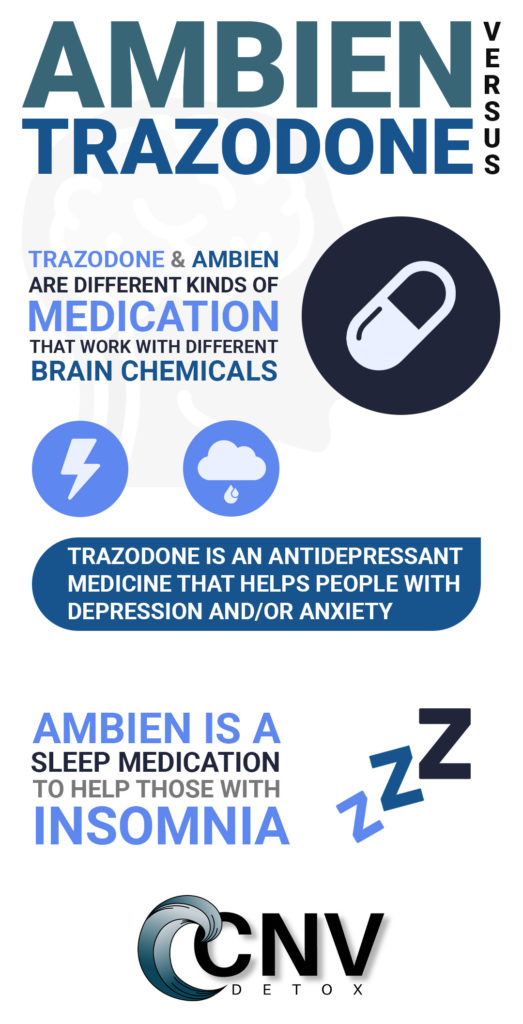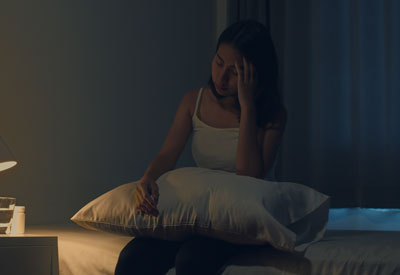According to the Journal of Family Medicine and Primary Care, some studies show that up to 60% of adults experience chronic insomnia. In short, insomnia is when a person has issues related to sleep. The National Institute on Drug Abuse (NIDA) writes that substance use causes sleep problems. Some people suffering from an addiction to drugs and alcohol may relapse to get a solid night of sleep.
Trazodone and Ambien (zolpidem) are medications that can help with insomnia. You should consider the fact that all medications have side effects before thinking about trazodone vs Ambien as options. Individuals can become dependent on medication, just like any other drug. Intensive care is likely the best option for people with a dual diagnosis.
What Are Trazodone and Ambien?

As aforementioned, trazodone and Ambien are types of medication that assist with sleep issues. The Sleep Foundation notes that a doctor will for the following characteristics before they diagnose a person with insomnia:
- Problems getting to sleep (sleep onset)
- Issues staying asleep (sleep maintenance)
- Sleeping far into the morning
- Excessive daytime sleepiness
There are two types of insomnia that either medication might be able to help with. One might help more than another. That’s why it’s important to look into trazodone vs Ambien.
Primary insomnia is when a person has an issue sleeping that is unrelated to any other health disorder. On the other hand, secondary insomnia is when a person has sleep issues because of a health issue. Health issues like chronic pain and anxiety can cause restless nights. Also, insomnia can be categorized into short-term and chronic. Short-term only lasts a short time, while chronic lasts three months or more.
What Is Trazodone?
Trazodone was initially used as an antidepressant. It falls into the medical class of serotonin antagonist and reuptake inhibitors (SARIs for short). It’s less effective to treat depression than other medications like Prozac and Zoloft, which are selective serotonin reuptake inhibitors (SSRIs).
It works by impeding the 5H2a receptor, which is a serotonin receptor. Hence, it blocks the serotonin transporter from making it to the receptor. Normally neurotransmitters, like serotonin, are reabsorbed into the nerve cells that produced them after they deliver a message.
Serotonin plays a role in:

- Mood stabilization
- Happiness
- Relaxation
- Bowel function
- Blood clotting
- Bone health
- Sleep
This medication hinders serotonin from being reabsorbed. That leaves more serotonin for the central nervous system to work with (CNS). The CNS is made up of multiple systems in the brain and spinal cord. It is in charge of regulating intelligence, memory, and learning. Also, it prepares the body for stressful situations and for rest, which plays into insomnia.
For this reason, trazodone may be prescribed to someone with insomnia or as a last line of action for someone suffering from depression. This SARI also has sedative effects, besides how it inhibits serotonin. It’s not a sedative per se, but can make a person feel more relaxed and ready to knock out for the night.
What Is Ambien?
Ambien is a type of drug that produces sleep. It falls into the sedative, or hypnotic, drug class. Ambien is a potent drug that acts almost like benzodiazepines (benzos), but it’s not one. Examples of benzos are Xanax and Valium.
People who consume sedatives may experience the following:
- Increased relaxation
- Feeling less stressed
- Drowsiness
- Impaired motor function
- Inability to retain new information
- Slowed heart rate and breathing
Ambien supposedly works by making more gamma-aminobutyric acid (GABA) available for the CNS to use. GABA is known as an inhibitory neurotransmitter, which is an amino that impedes the flow of chemical messages. The more GABA available for the CNS to use, the more the body’s systems slow down. This includes the parts of the systems that keep people awake and alert.
A doctor may opt to prescribe this medication over others because it has a short half-life. A half-life, in terms of medication, is how long it takes the body to half a medication’s concentration. So, Ambien’s short half-life means it’s fast-acting, doesn’t need a large dose, and doesn’t remain in the body for a long period of time. Though, the dose of Ambien may change depending on the type of insomnia a person has.
What’s the Difference Between Trazodone and Ambien?
The difference between trazodone and Ambien as sleep aids are that they’re different types of medication and work with different brain chemicals. Trazodone was developed to help people with depression. Ambien was specifically made to help people with insomnia. Additionally, it can take trazodone weeks to work.

Also, using Ambien to treat insomnia isn’t “off-label,” according to the Food and Drug Administration (FDA). In comparison, using trazodone for insomnia is considered “off-label.” The FDA writes “off-label” use is when a doctor prescribes FDA-approved medication for unapproved reasons.
That doesn’t mean that the medication won’t be effective or is illegal. It just means the company that produces the medicine hasn’t submitted the proper clinical data and additional information for the FDA to review.
Doctors may prescribe medication for “off-label” use when:
- They judge it’s appropriate
- There isn’t an approved medication on the market to treat a particular condition
- A patient has exhausted all forms of other treatment
- A doctor wants to try a different dose than what the FDA has approved
- The doctor wants to administer the drug in a different form that’s unapproved by the FDA (i.e.: capsule vs oral solution)
Also, Ambien is a sedative versus trazodone, a SARI with sedative-like properties. Knowing the differences between the two can help a patient stay informed. They might prefer using one over another.
What Are the Side Effects of Trazodone and Ambien?
Both Ambien and trazodone have side effects like any other medication. People should only resort to a prescription when they’ve exhausted all other options. Medications can also cause severe allergic reactions, leading to a costly hospital visit. It’s worth weighing the side effects of both of these drugs.
Trazodone Side Effects
Some patients notice a trazodone appetite suppressant effect after they consume it. The National Health Service (NHS) writes that it can actually increase or decrease hunger levels depending upon who takes it. If this happens where it results in severe weight loss or gain, talk to a doctor.
Other side effects of trazodone, sometimes called a trazodone hangover, include:
- Feeling overly tired
- Body aches and pains
- Feeling fluish
- Dry mouth
- Constipation
Less common side effects are:
- Seizures
- An abnormal heartbeat
- A long-lasting and painful erection
- Skin or the whites of eyes turn yellow
- More infections than usual
An allergic reaction is different from side effects. Side effects other than the ones mentioned, like wheezing and swelling, need immediate care. The NHS also writes that taking this medication while pregnant could affect the unborn baby. Certain conditions and medication can cause adverse effects.
Ambien Side Effects
When it comes to trazodone vs Ambien, they both have similar side effects. Ambien seems to have more side effects as a whole. Though, unlike trazodone, it’s highly addictive. Doctors typically won’t prescribe for more than two weeks because of this. Ambien side effects can be broken down into very common, common, uncommon, and rare.

Very common symptoms mean they happen to more than 10% of patients:
- Dizziness (around a quarter of patients)
- Headache
- Light drowsiness
Common symptoms range from 1% to 10% of patients:
- Amnesia
- Attention disturbance
- Burning sensation
- Difficulty maintaining balance
- Drowsiness
- Lethargy
- Feeling light-headed
- Memory issues
- Vertigo
Uncommon and rare symptoms of Ambien (0.1% to 1%) are:
- Migraines
- Stupor
- Speech disorders
- Dementia
- Fainting
- Issues with taste
- Restless legs
The symptoms mentioned aren’t an exhaustive list. There is a risk taking medication, prescribed or not. Talk to a doctor about the side effects before consuming Ambien. Also, certain medications and conditions can increase the chances of adverse effects.
Are There Alternatives to Trazodone and Ambien?
Before thinking about trazodone vs Ambien, consider natural alternatives. There are herbal supplements that may be able to help with insomnia, even in the worst cases. Two supplements that can help with sleep issues are melatonin and valerian root.
Melatonin is typically made synthetically. They’re made to mimic the naturally-occurring brain chemical, melatonin. This chemical is produced in sync with the dark-light cycle. Being exposed to light before bed, even if it’s hours before, can disrupt melatonin production. Melatonin can come as a liquid, capsule, or vaporizer. They may come in other forms
Valerian root may be a good option for those with insomnia. The medicine department of University of Michigan says that valerian root is a herbal supplement that has effects similar to trazodone and Ambien. In other words, this herbal supplement can aid sleep issues, anxiety, and depression. Also, it can help with cramps. The university does mention it can take weeks for valerian root to help serious cases of insomnia.
Trazodone and Ambien Can’t Always Help Underlying Issues
Although trazodone and Ambien can’t always help underlying issues, CNV Detox can. Secondary insomnia can come about because of a substance use disorder or mental illness. CNV Detox helps members take the first step to long-lasting recovery from addiction, and possibly insomnia. If you don’t pull out a weed by the roots it will continue to grow. Contact us if you have a substance use disorder and insomnia before thinking about trazodone vs Ambien.





